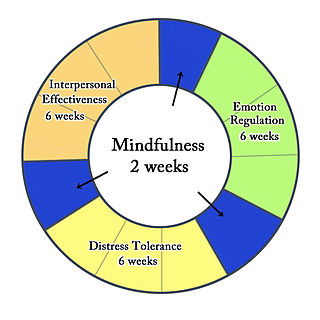Neurosis is a term mainly used today by followers of Freudian thinking to describe mental disorders caused by past anxiety, often that has been repressed. In recent history, the term has been used to refer to anxiety-related conditions more generally.
Post-traumatic stress disorder (PTSD) is a mental and behavioral disorder that develops from experiencing a traumatic event, such as sexual assault, warfare, traffic collisions, child abuse, domestic violence, or other threats on a person's life or well-being. Symptoms may include disturbing thoughts, feelings, or dreams related to the events, mental or physical distress to trauma-related cues, attempts to avoid trauma-related cues, alterations in the way a person thinks and feels, and an increase in the fight-or-flight response. These symptoms last for more than a month after the event. Young children are less likely to show distress, but instead may express their memories through play. A person with PTSD is at a higher risk of suicide and intentional self-harm.

Dialectical behavior therapy (DBT) is an evidence-based psychotherapy that began with efforts to treat personality disorders and interpersonal conflicts. Evidence suggests that DBT can be useful in treating mood disorders and suicidal ideation as well as for changing behavioral patterns such as self-harm and substance use. DBT evolved into a process in which the therapist and client work with acceptance and change-oriented strategies and ultimately balance and synthesize them—comparable to the philosophical dialectical process of thesis and antithesis, followed by synthesis.
Psychological trauma is an emotional response caused by severe distressing events such as accidents, violence, sexual assault, terror, or sensory overload.
Eye movement desensitization and reprocessing (EMDR) is a form of psychotherapy. It was devised by Francine Shapiro in 1987 and originally designed to alleviate the distress associated with traumatic memories such as post-traumatic stress disorder (PTSD).
Barbara Rothbaum is a psychologist at Emory University School of Medicine in Atlanta, Georgia. She is a professor in the Psychiatry department and a pioneer in the treatment of anxiety-related disorders. Rothbaum is head of the Trauma and Anxiety Recovery Program (TARP) at Emory as well as the Emory Healthcare Veterans Program. In the mid-1990s she founded a virtual exposure therapy company called Virtually Better, Inc. This company treats patients with anxiety disorders, addictions, pain, and the like using virtual reality instead of the actual place or scenario. It also allows the therapist to control the environment. She also played a key role in the development of the treatment of posttraumatic stress disorder (PTSD).

Complex post-traumatic stress disorder (CPTSD) is a stress-related mental disorder generally occurring in response to complex traumas, i.e. commonly prolonged or repetitive exposures to a series of traumatic events, within which individuals perceive little or no chance to escape.

Edna Foa is an Israeli professor of clinical psychology at the University of Pennsylvania, where she serves as the director of the Center for the Treatment and Study of Anxiety. Foa is an internationally renowned authority in the field of psychopathology and treatment of anxiety. She approaches the understanding and treatment of mental disorders from a cognitive-behavioral perspective.
Exposure therapy is a technique in behavior therapy to treat anxiety disorders. Exposure therapy involves exposing the target patient to the anxiety source or its context without the intention to cause any danger (desensitization). Doing so is thought to help them overcome their anxiety or distress. Procedurally, it is similar to the fear extinction paradigm developed for studying laboratory rodents. Numerous studies have demonstrated its effectiveness in the treatment of disorders such as generalized anxiety disorder, social anxiety disorder, obsessive-compulsive disorder, post-traumatic stress disorder (PTSD), and specific phobias.
Prolonged exposure therapy (PE) is a form of behavior therapy and cognitive behavioral therapy designed to treat post-traumatic stress disorder. It is characterized by two main treatment procedures – imaginal and in vivo exposures. Imaginal exposure is repeated 'on-purpose' retelling of the trauma memory. In vivo exposure is gradually confronting situations, places, and things that are reminders of the trauma or feel dangerous. Additional procedures include processing of the trauma memory and breathing retraining.
Cognitive processing therapy (CPT) is a manualized therapy used by clinicians to help people recover from posttraumatic stress disorder (PTSD) and related conditions. It includes elements of cognitive behavioral therapy (CBT) treatments, one of the most widely used evidence-based therapies. A typical 12-session run of CPT has proven effective in treating PTSD across a variety of populations, including combat veterans, sexual assault victims, and refugees. CPT can be provided in individual and group treatment formats and is considered one of the most effective treatments for PTSD.
PTSD or post-traumatic stress disorder, is a psychiatric disorder characterised by intrusive thoughts and memories, dreams or flashbacks of the event; avoidance of people, places and activities that remind the individual of the event; ongoing negative beliefs about oneself or the world, mood changes and persistent feelings of anger, guilt or fear; alterations in arousal such as increased irritability, angry outbursts, being hypervigilant, or having difficulty with concentration and sleep.

Richard McNally is a professor and director of clinical training at Harvard University's department of psychology. As a clinical psychologist and experimental psycho-pathologist, McNally studies anxiety disorders and related syndromes, such as post-traumatic stress disorder, obsessive–compulsive disorder, and complicated grief.
Rachel Yehuda is a professor of psychiatry and neuroscience, the vice chair for veterans affairs in the psychiatry department, and the director of the traumatic stress studies division at the Mount Sinai School of Medicine. She also leads the PTSD clinical research program at the neurochemistry and neuroendocrinology laboratory at the James J. Peters VA Medical Center. In 2020 she became director of the Center for Psychedelic Psychotherapy and Trauma Research at Mount Sinai.

Richard Allan Bryant is an Australian medical scientist. He is Scientia Professor of Psychology at the University of New South Wales (UNSW) and director of the UNSW Traumatic Stress Clinic, based at UNSW and Westmead Institute for Medical Research. His main areas of research are posttraumatic stress disorder (PTSD) and prolonged grief disorder. On 13 June 2016 he was appointed a Companion of the Order of Australia (AC), for eminent service to medical research in the field of psychotraumatology, as a psychologist and author, to the study of Indigenous mental health, as an advisor to a range of government and international organisations, and to professional societies.
Post-traumatic stress disorder (PTSD) can affect about 3.6% of the U.S. population each year, and 6.8% of the U.S. population over a lifetime. 8.4% of people in the U.S. are diagnosed with substance use disorders (SUD). Of those with a diagnosis of PTSD, a co-occurring, or comorbid diagnosis of a SUD is present in 20–35% of that clinical population.

Dual representation theory (DRT) is a psychological theory of post-traumatic stress disorder (PTSD) developed by Chris Brewin, Tim Dalgleish, and Stephen Joseph in 1996. This theory proposes that certain symptoms of PTSD - such as nightmares, flashbacks, and emotional disturbance - may be attributed to memory processes that occur after exposure to a traumatic event. DRT proposes the existence of two separate memory systems that run in parallel during memory formation: the verbally accessible memory system (VAM) and situationally accessible memory system (SAM). The VAM system contains information that was consciously processed and thus can be voluntarily recalled or described. In contrast, the SAM system contains unconsciously processed sensory information that cannot be voluntarily recalled. This theory suggests that the VAM system is impaired during a traumatic event because conscious attention is narrowly drawn to threat-related information. Therefore, memory of the trauma is heavily focused on fear, which affects information processing. This gives rise to PTSD symptoms such as trauma-related cognitions, appraisals, and emotions. The SAM system captures vivid sensory information during the traumatic event, which is automatically recalled through exposure to trauma-related triggers. This system is thought to be responsible for the presence of flashbacks and nightmares in PTSD symptomatology.

Internet-based treatments for trauma survivors is a growing class of online treatments that allow for an individual who has experienced trauma to seek and receive treatment without needing to attend psychotherapy in person. The progressive movement to online resources and the need for more accessible mental health services has given rise to the creation of online-based interventions aimed to help those who have experienced traumatic events. Cognitive behavioral therapy (CBT) has shown to be particularly effective in the treatment of trauma-related disorders and adapting CBT to an online format has been shown to be as effective as in-person CBT in the treatment of trauma. Due to its positive outcomes, CBT-based internet treatment options for trauma survivors has been an expanding field in both research and clinical settings.
J. Gayle Beck is a licensed clinical psychologist who specializes in trauma stress disorders and anxiety disorders. She is the Lillian and Morrie Moss Chair of Excellence in the Department of Psychology at the University of Memphis.
Psychological trauma in adultswho are older, is the overall prevalence and occurrence of trauma symptoms within the older adult population.. This should not to be confused with geriatric trauma. Although there is a 90% likelihood of an older adult experiencing a traumatic event, there is a lack of research on trauma in older adult populations. This makes research trends on the complex interaction between traumatic symptom presentation and considerations specifically related to the older adult population difficult to pinpoint. This article reviews the existing literature and briefly introduces various ways, apart from the occurrence of elder abuse, that psychological trauma impacts the older adult population.





